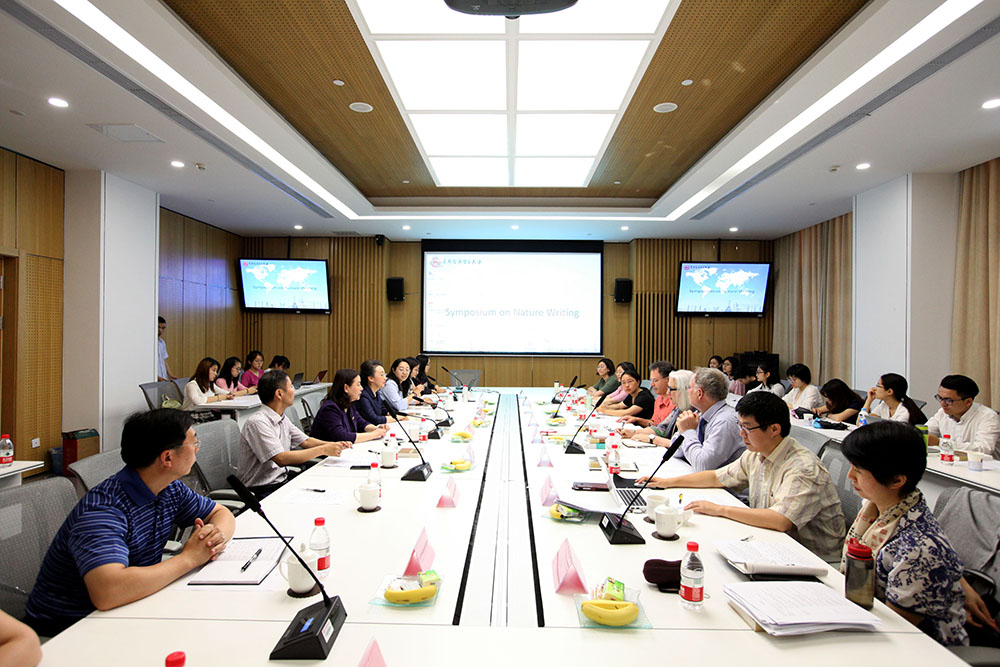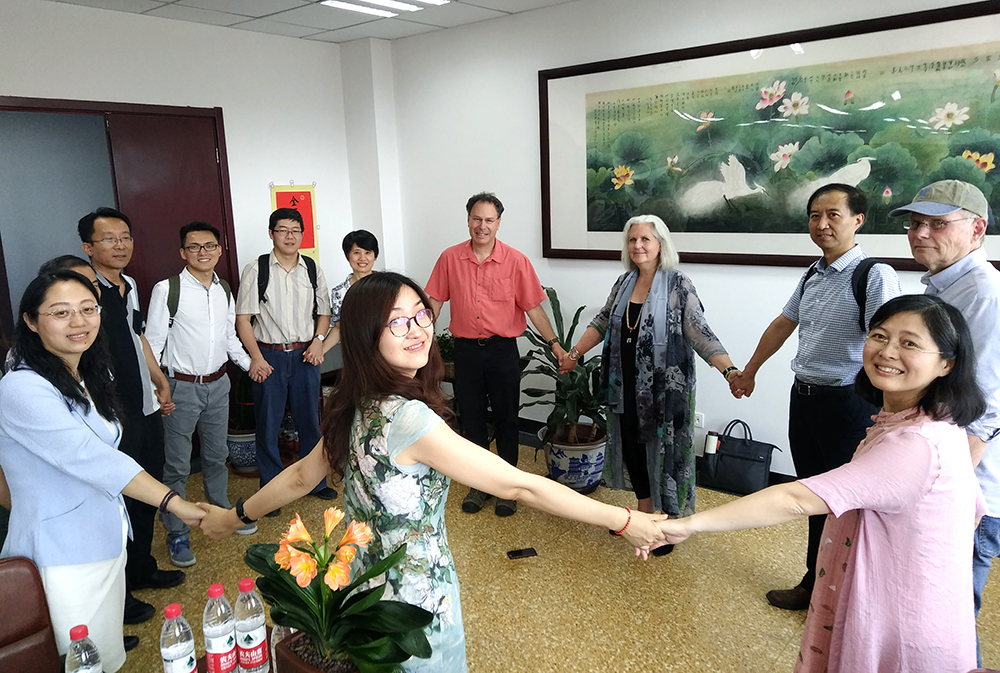Natural Literature and Ecological Research in the New Era Forum Held in CUEB
On the morning of June 16th, the forum of "Natural Literature and Ecology Research in the New Era" held by CUEB School of Foreign Studies took place in the Tianlang Hall of Boyuan Building. Chinese and foreign scholars discussed from different perspectives on natural literature, traditional culture, environment and ecological criticism. Deputy Party Secretary Xu Fang attended the forum and made remarks. Teachers and students from the School of Foreign Studies, team of the Natural Literature Research Center, and experts and scholars from US and Chinese universities gathered at the forum.

At the opening ceremony, Shi Haiyu, associate professor with the School of Foreign studies and director of the Natural Literature Research Center, introduced the guests and three U.S. experts: Scott Slovic, dean of the English Department of Idaho University, Terry T. Williams , famous ecological writer and activist, Brooke Williams, naturalist, writer and explorer, Zhang Hua, professor of Beijing Language and Culture University, Fang Hong, professor of Nanjing University, Wei Qingqi, professor of Nanjing Normal University, Liu Bei, professor of Shandong Normal University, Zhong Yan, associate professor of China Agricultural University.

CUEB Professor Cheng Hong made a riveting and moving opening speech. She pointed out that it was the theme of "the relationship between man and nature" that brought us together. Professor Cheng Hong cited a poem about nature from 19th century legendary American poet Emily Dickinson and five-character quatrains from Tang Dynasty poet Li Bai, Sitting Aloneat Jingting Mountain.Her comparison of the two poems brought the audience to a dialogue between the ancient and modern, between the east and the west. She said that the get-together of scholars home and abroad enabled a dialogue across space. Eastern and western literature has different ways to describe nature. Many United States writers adopt a narrative approach. American natural literature has a long history with a great number of representative authors and works.
In China, nature is often described from the perspective of artistic conception. In Chinese traditional classical literature, the description of nature accords with the principle of "poetry in the painting, painting in the poetry”, which embodies the artistic integration of “poetry”, “writing” and “painting”. It shows that in different historical periods and against different cultural backgrounds, ways to describe nature are of great diversity. Finally, Professor Cheng Hong summed up the wilderness complex of Terry Williams: "Now we are together, but soon we are apart. Although we will separate, we still live on the one earth and look at the same moon. We are inseparable."
In the first session, Fang Hong, the Williams, Schmidt Slavic spoke respectively. Fang Hong's paper, "In Nature Writing Lies the Salvation of the World: Literary Representation of Life-events Presentation in the Natural Literature", unfolds on key words like wilderness, gender, natural writing and cultural significance, and explores the relationship between wilderness and modern civilization, wilderness protection and the wilderness experience with different gender identities.
Next, the Williams couple gave a lecture titled "Bringing Richard Jefferies’s The story of My Heart into the Twenty-First Century ". Terri encapsulated the integration in the same community and the same home in the Chinese concept “Nature and Man in One”. Schmidt Slavic gave a lecture on "Reading the world: Language, Mind, Body", sharing his own experience of nature and teaching experience through photo display, theoretical introduction, and storytelling.
In the second session, Zhong Yan and Su Mingming, teacher of CUEB’s School of Foreign Studies, presented their studies on the theme of nature. Zhong Yan's speech, "Blue Studies: Toward a Water Globe Ecocriticism", introduced the origin of the blue studies and pointed out that in face of the civilization crisis probably arisen from the river crisis, one should examine the river ethic and think thoroughly about water conservancy under the new trend of ecological criticism. Su Mingming's speech, "The Theory of Natural Selection: Darwin's Concept of Nature", focused on the study of the relationship between natural selection theory and Darwinian view of nature, and showed the great academic value of combining the Darwin’s theory with nature writing and the importance of rereading The Origin of Species.
The third session highlighted the contrast and exchange between Chinese and Western cultures, during which Liu Bei, Wei Qingqi, and Zhang Hua made speeches. Liu Bei talked about "Sense of Place in the Stories of a Painting". She introduced one of the most famous paintings in the Chinese art history- Zhao Mengfu's painting "Magpie in Autumn" and the story behind this piece of work, which proved that there was obvious differences in sense of place against the yardstick of personal feelings, social relations and natural geography. Wei Qingqi's speech, "The Myth of Yin: Context and the Journal of Daoist Ecofeminism", revealed the Taoist philosophy and the operation mechanism of yin and yang through the interpretation of the basic concept of Taoism - yin and yang. Wei suggested that it was necessary to establish dialogue between the Taoism, heritage of the ecological wisdom, and the ecological feminism so as to realize the localization of ecological feminism. Then, Zhang made a lecture entitled "Nature in" Wen-Sin-Diao-Long ". He introduced Liu Xie, author of the Chinese classical literature comment Wen-Sin-Diao-Long(the Literary Heart and the Carving of Dragons), and analyzed the far-reaching impact of natural concepts and works in this book on literary theory, aesthetic theory, and religious doctrine.
In the afternoon, all experts and scholars visited CUEB Nature Writing Collection Room at university library. During the visit, Terry proposed that everyone should join hands to protect our earth.
